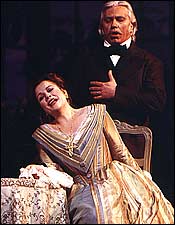
After two postponements and a quiet out-of-town tryout not long ago in Houston, Renée Fleming finally broke the suspense and is now singing her first Violetta in La Traviata at the Metropolitan Opera. Clearly, Fleming has had her reasons for waiting so long to tackle Verdi’s consumptive courtesan, a classic role that is, theoretically at least, ideally suited to her sumptuously lyric but impressively agile soprano, although the delay still seems rather puzzling. In any event, she opened the new Met season in a revival of Franco Zeffirelli’s powder-puff production and seemed quite at home in it.
That said, among the many Violettas I have known and loved, I can’t rate this fussy interpretation very highly, either as a character portrait or as a purely musical experience. Fleming has lately developed an arsenal of irritating vocal mannerisms, arbitrary devices that seem more willfully applied than emerging naturally from a role’s expressive requirements. Her work here is consistently disfigured by inappropriate scooping into notes, pitch bending, and taffy-pull phrasing—stylistic eccentricities that create an aura of total artificiality and annoy anyone who cares about honest Verdi singing.
Nor are Fleming’s ideas about Violetta’s dilemma any more real or convincing. If a playgirl wants to show gay abandon by throwing a champagne glass into the wings, she had better mean it—the impulse must come from somewhere inside the character or the gesture will look, as it did here, downright comical. Then, too, Fleming’s melodramatically overcooked reading of Germont’s letter in the final act, capped by an absurdly groaned “È tardi!” (“Too late!”), just sounded vulgar. And why such an attractive woman would apply all that makeup and airbrushing to turn herself into a Stepford wife—oh, those affected “glamour” press photos for her Rolex ads and new record covers—completely baffles me. It could be that Fleming aims to transform herself into some kind of crossover version of Madonna. If so, she is sabotaging a wonderfully natural vocal talent in the process.
Perhaps our diva should have listened more carefully to her colleagues in this La Traviata and learned something from them. Both Ramón Vargas as Alfredo and Dmitri Hvorostovsky as Germont have voices just as lovely and liquid as Fleming’s, but they also sculpt phrases with winning musicality and patrician poise while still finding ways to color their tone, give the words full emotional weight, and bring the char- acters to dramatic life. As he often is with Verdi, though, conductor Valery Gergiev can be maddeningly unpredictable, one moment conjuring up the most ravishing orchestral effects and the next moment rushing headlong through the score as if he were late for his next engagement.
Two James Levine specialties followed this self-indulgent opening-night gala. The first was a revival of Tristan und Isolde with substantially the same cast that appeared in it when the production was first performed in 1999. There was much to admire back then, and there is even more to like now, especially since the singers clearly feel more comfortable with the production and the orchestra has had an opportunity to fine-tune the score into a truly luminous statement—what a pity that the production was videotaped four years ago, before it had a chance to become more seasoned. Jane Eaglen particularly has endured some rocky Met evenings since then, but at this revival, her soprano sounds rested, secure, and evenly produced, even if her placid temperament and embonpoint will always limit her ability to get inside this complex character. Ben Heppner is also unlikely to give us a Tristan of searing psychological penetration, but the sheer lyrical beauty he brings to the music amply compensates.
René Pape repeats his overwhelming King Marke, searing and eloquent; Richard Paul Fink remains an intensely devoted Kurwenal; and Wendy White stepped in on opening night to contribute a touching Brangäne. Directed by Dieter Dorn and designed by Jürgen Rose, this is a spare Tristan in both its look and its action, surely in part to accommodate the static stage personae of the two principals. Even at that, there is much that is compelling about this production, from the hypnotic triangular panels that draw the eye into infinity to the oddly moving toy replicas from Tristan’s past that appear as he painfully dredges up memories from his unconscious and prepares to die.
If Levine has found an emotional center to Tristan that I missed the last time around, the conductor’s way with Mozart has always been exceptional. Le Nozze di Figaro entered the repertory on the third night of the season, and a joy it is from first note to last. But then, it always has been under Levine, whose lyrical but structurally balanced view of the score gets right to the heart of this sublime music. Two debuts at the first performance added to the distinctions of this Figaro. Some may be bothered by the fast vibrato that gives Dorothea Röschmann’s soprano its heady appeal, but not I—her Susanna is bewitchingly sung and her ebullient spirit onstage is irresistible. In perfect contrast, Anja Harteros’s coolly contained but easily wounded Countess is sung with a tear in the voice and exquisite vocal control.
The production is still credited to Jonathan Miller, and it is one of the British director’s less intrusive efforts. The staging is mostly concerned with clarity of movement, which is all to the good in an opera this busy, along with giving the performers ample leeway to develop their own views of the characters. Not one singer in the current cast strikes a false note: John Relyea’s virile Figaro, Dwayne Croft’s dangerously self-absorbed Count, Katarina Karnéus’s hot-as-a-hornet Cherubino, Michel Sénéchal’s deliciously fey Don Basilio, John Del Carlo’s pompously harmless Don Bartolo, and Jane Bunnell’s heart-of-gold Marcellina. Figaro never seems to go wrong at the Met these days, and the present cast maintains the high standards.